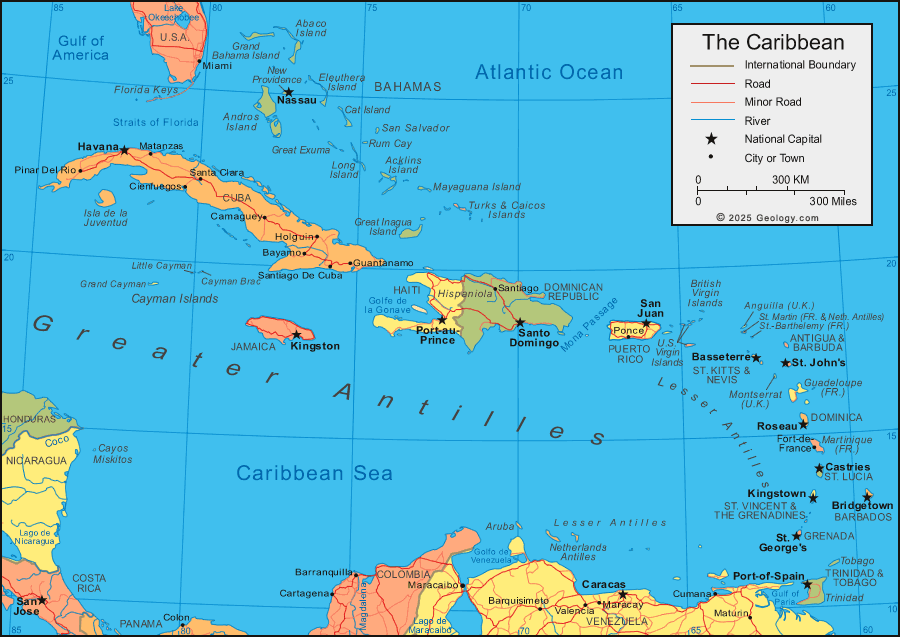- 10 Aug 2012 05:48
#14028056
 KFlint I wanted to give you a brief and interesting history of the island that might be of interest to you. Did you know that Puerto Rico was actually the name of the city and the island was named San Juan Bautista. St. John the Baptist. But over time the name of the capital city and the name of the island were exchanged (the names flip-flopped). The original Indian name for the island was Bo-ri-ken. Or "Borinquen" in Spanish. It meant in the Taino language "The land of the Noble Lord". Tainos were part of the Arawak group from the tropical zones of South America. Genetically the Tainos are related to the indigenous groups in the Venezuelan and Colombian jungles. Compared to the native Caribs they were 'newcomers' to the Caribbean basin.
KFlint I wanted to give you a brief and interesting history of the island that might be of interest to you. Did you know that Puerto Rico was actually the name of the city and the island was named San Juan Bautista. St. John the Baptist. But over time the name of the capital city and the name of the island were exchanged (the names flip-flopped). The original Indian name for the island was Bo-ri-ken. Or "Borinquen" in Spanish. It meant in the Taino language "The land of the Noble Lord". Tainos were part of the Arawak group from the tropical zones of South America. Genetically the Tainos are related to the indigenous groups in the Venezuelan and Colombian jungles. Compared to the native Caribs they were 'newcomers' to the Caribbean basin.
Puerto Rico is almost three fourths mountainous. Its plains and flat lands are extremely over populated. It has a lot of interdependent micro climates that are very well balanced. Puerto Rico has lost enormous amounts of virgin forest with development. It is one of the world's most densely populated land bases in the world. It has a lot of people per square mile. It doesn't have nuclear power at all for its electricity. It is located in a volcanic area of the world but has no active volcanic activity. It had no indigenous predators such as jaguars, poisonous snakes, etc.
At the time of the conquest, it had tremendously pure water with plentiful rivers, streams and underground caverns of all sorts.
Politically it belonged to Spain from about 1493-1898. It was ruled by military US appointees from 1898-1948. Fifty years without any self rule of any sort from the USA. This is of course due to the Spanish American war. If ever you are in San Juan (the Capital city) you will see the clock stopped in 'La Fortaleza' (the Governors' mansion), in the exact minute when Spain stopped ruling Puerto Rico. The Spanish put a sword through the clock.
Puerto Rican history is a Caribbean island history that has to do with having to adapt to rules and laws established to favor interests that were located far, far away. And that had little to do with local needs. How these two reconciled is quite interesting and also a study in human adaptation and human behavior.
One of the most interesting ethnographers and anthropologists who have studied Puerto Rican culture for many years is a man by the name of Sidney Mintz. His book:
http://sidneymintz.net/sugar.php
If you study the history of sugar in the world KFlint....you get an idea of why areas of the world that had the right climate for sugar became so desireable to colonize. The history of the land and the people who occupy that land all are interconnected. It all makes 'sense' to study all cultures within their geographical and physical context. The history of the Caribbean is about the beginning of the Americas. It is called the "Antilles" which is 'the before'. We are the 'before' of the Americas.
Which part of Puerto Rico do you want to study KFlint? The history of the people? The history of the language? The history of the land? The political problems? The activists? The political figures? The artists and musicians? the writers and poets? What? The Scientists? The astronomers and physicists?
Many people don't really think Puerto Rico amounted to much before the USA arrived. Lol. But the USA arrived interested in acquiring the island for the reasons that Mintz describes in his anthropological research on the history of a commodity. Sugar.
Also the USA had an interest in expanding and it was still in the throes of its manifest destiny stage as well.
Where do you want to go with this KFlint?
Soy tuya para hacer conmigo lo que quieras (I am yours to do with as you will).
 KFlint I wanted to give you a brief and interesting history of the island that might be of interest to you. Did you know that Puerto Rico was actually the name of the city and the island was named San Juan Bautista. St. John the Baptist. But over time the name of the capital city and the name of the island were exchanged (the names flip-flopped). The original Indian name for the island was Bo-ri-ken. Or "Borinquen" in Spanish. It meant in the Taino language "The land of the Noble Lord". Tainos were part of the Arawak group from the tropical zones of South America. Genetically the Tainos are related to the indigenous groups in the Venezuelan and Colombian jungles. Compared to the native Caribs they were 'newcomers' to the Caribbean basin.
KFlint I wanted to give you a brief and interesting history of the island that might be of interest to you. Did you know that Puerto Rico was actually the name of the city and the island was named San Juan Bautista. St. John the Baptist. But over time the name of the capital city and the name of the island were exchanged (the names flip-flopped). The original Indian name for the island was Bo-ri-ken. Or "Borinquen" in Spanish. It meant in the Taino language "The land of the Noble Lord". Tainos were part of the Arawak group from the tropical zones of South America. Genetically the Tainos are related to the indigenous groups in the Venezuelan and Colombian jungles. Compared to the native Caribs they were 'newcomers' to the Caribbean basin. Puerto Rico is almost three fourths mountainous. Its plains and flat lands are extremely over populated. It has a lot of interdependent micro climates that are very well balanced. Puerto Rico has lost enormous amounts of virgin forest with development. It is one of the world's most densely populated land bases in the world. It has a lot of people per square mile. It doesn't have nuclear power at all for its electricity. It is located in a volcanic area of the world but has no active volcanic activity. It had no indigenous predators such as jaguars, poisonous snakes, etc.
At the time of the conquest, it had tremendously pure water with plentiful rivers, streams and underground caverns of all sorts.
Politically it belonged to Spain from about 1493-1898. It was ruled by military US appointees from 1898-1948. Fifty years without any self rule of any sort from the USA. This is of course due to the Spanish American war. If ever you are in San Juan (the Capital city) you will see the clock stopped in 'La Fortaleza' (the Governors' mansion), in the exact minute when Spain stopped ruling Puerto Rico. The Spanish put a sword through the clock.
Puerto Rican history is a Caribbean island history that has to do with having to adapt to rules and laws established to favor interests that were located far, far away. And that had little to do with local needs. How these two reconciled is quite interesting and also a study in human adaptation and human behavior.
One of the most interesting ethnographers and anthropologists who have studied Puerto Rican culture for many years is a man by the name of Sidney Mintz. His book:
http://sidneymintz.net/sugar.php
If you study the history of sugar in the world KFlint....you get an idea of why areas of the world that had the right climate for sugar became so desireable to colonize. The history of the land and the people who occupy that land all are interconnected. It all makes 'sense' to study all cultures within their geographical and physical context. The history of the Caribbean is about the beginning of the Americas. It is called the "Antilles" which is 'the before'. We are the 'before' of the Americas.
Which part of Puerto Rico do you want to study KFlint? The history of the people? The history of the language? The history of the land? The political problems? The activists? The political figures? The artists and musicians? the writers and poets? What? The Scientists? The astronomers and physicists?
Many people don't really think Puerto Rico amounted to much before the USA arrived. Lol. But the USA arrived interested in acquiring the island for the reasons that Mintz describes in his anthropological research on the history of a commodity. Sugar.
Also the USA had an interest in expanding and it was still in the throes of its manifest destiny stage as well.
Where do you want to go with this KFlint?
Soy tuya para hacer conmigo lo que quieras (I am yours to do with as you will).

La historia de mi amor
se pudiera encontrar
en cada corazón,
en cada soledad.
Silvio Rodriguez
se pudiera encontrar
en cada corazón,
en cada soledad.
Silvio Rodriguez

















 - By Pants-of-dog
- By Pants-of-dog - By Potemkin
- By Potemkin